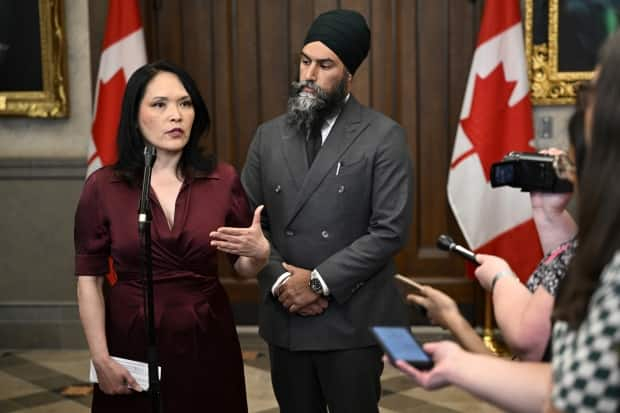PM's national security adviser says there's been a 'breakdown' in how intelligence is shared

Prime Minister Justin Trudeau's national security and intelligence adviser says that while Canada's security services failed to warn MPs and those at the highest levels of government about China's intimidation tactics in a timely manner, the breakdown in that process wasn't the fault of any one person.
"There is no one person. There is no single point of failure," Jody Thomas told a parliamentary committee Thursday morning.
"There was a flaw in the process."
The senior public servant's testimony comes after three MPs publicized information they've received from the Canadian Security Intelligence Service about the Chinese government's campaigns against them — and a week after a report called out serious problems with the way the government handles secret information.
Thomas told the procedure and House affairs committee she only learned recently that former Conservative leader Erin O'Toole and NDP MP Jenny Kwan were targeted by Beijing.
WATCH | O'Toole rises in House on foreign interference
Thomas told MPs CSIS briefed her on these cases over the "last three to four weeks" and that Trudeau himself only learned about them recently.
"How is that possible?" asked Conservative MP Micheal Cooper. "How is that conceivable?"
"I agree that there needs to be a better management of intelligence that is coming into deputy ministers' offices, ministers' offices, into the [National Security and Intelligence Adviser's office], in order to brief the prime minister," Thomas replied.
"I understand completely that the information that has been leaked to the media or now briefed to members of Parliament is shocking and disturbing to hear. It should not have happened in this matter."
Earlier this week, both O'Toole and Kwan described the briefings they received from CSIS.
O'Toole told the House of Commons Tuesday that CSIS told him he has been an ongoing target of a Chinese government campaign of misinformation and "voter suppression" that covered the last federal election campaign.

Kwan told reporters Monday that CSIS told her she is an "evergreen" target for Beijing. Both O'Toole and Kwan said China's government is singling them out over their vocal support for democracy in Hong Kong and for religious and cultural minorities in China.
The procedure and House affairs committee has been studying Beijing's intimidation campaigns, including the targeting of Conservative MP Michael Chong.
No one person to blame: Thomas
In a report released last week, former governor general David Johnston — appointed by Trudeau as a special rapporteur on foreign interference — found evidence that Chinese officials contemplated taking unspecified action against Chong in 2021 and sought to build a profile on him.
Trudeau and Thomas have both said they only learned about the campaign against Chong after the Globe and Mail published a story last month.
Thomas said CSIS sent a memo in July 2021 to three deputy ministers across government, but the message effectively went into a "black hole."
WATCH | 'We have rectified' how ministers and PM will receive CSIS briefings: Thomas
Thomas, who took over the job of national security adviser in 2022, told MPs on the committee she won't speculate about what happened before her tenure.
"I think there was a breakdown in process. Not only a breakdown in process, I think an insufficient process," she said.
Citing a recent directive to CSIS ordering it to do a better job of informing MPs at risk, Thomas said the process has been "rectified." She also said she's brought in a process to better manage the flow of information at the deputy minister level.
"It is a system that has operated for years and we are adding structure to it," she said.
Blair didn't receive CSIS note on Chong: report
Johnston's report on foreign interference also found that CSIS sent an "issues management note" to the then-public safety minister Bill Blair, his chief of staff and his deputy minister in May of 2021. He said the note warned of "intelligence that the [People's Republic of China] intended to target Mr. Chong, another MP, and their family in China (if any)."
Johnston's report concluded that neither Blair nor members of his staff received the note because they didn't "have access to the Top Secret Network e-mail on which it was sent."
Blair told the committee that means CSIS authorized him to see the information but CSIS's director determined it wasn't information he needed to know. The minister said that when CSIS wanted to share sensitive information with him, it would arrange a briefing at a secure facility.
"I was never notified of the existence of that intelligence," Blair said Thursday, referring to the Chong note.
Outside of committee, Blair said he has "no idea" if his former deputy ever had access to the material and said he doesn't have enough information to say whether CSIS director David Vigneault is to blame for the intelligence-sharing failures.
Chong told reporters that the failure to notify him that his family might be targeted amounted to a "systemic breakdown in the machinery of government."
"It is certainly the most prominent, but not the only, example of poor information flow and processing between agencies, the public service and ministers," wrote Johnston in his report.


